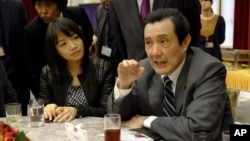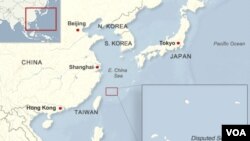TAIPEI —
Taiwan President Ma Ying-jeou is urging his powerful neighbors China and Japan to end their islands dispute and share resources in the hotly contested sea between them. Taiwan also claims sovereignty over the Japanese-controlled islands and wants three-way talks on natural resources.
President Ma Ying-jeou told a news conference on Thursday that Taiwan, China and Japan should set aside differences without giving up sovereignty claims.
Repeating a call for peace that he first made in August, the president said that natural resources lay at the center of the dispute, but that they could be shared.
He says no one is going to back down in terms of sovereignty if claims are not settled, but that resources can still be shared in certain situations. He says his peace initiative not only emphasizes that no sovereignty claim would be affected, but also enables all sides to set aside differences and carry out talks related to natural resources.
Taiwan calls the islets the Tiaoyutai. China calls them Diaoyu, and they are known as the Senkakus in Japan. Whoever controls the islets also commands a large territorial sea area.
The uninhabited islets some 220 kilometers from Taipei are rich in fisheries and may sit near undersea natural gas reserves.
The ownership dispute became heated last year after Tokyo bought the islets from a private owner. Since then, Japanese and Chinese vessels have faced standoffs in the ocean. Taiwan activists have also made trips to the area to reinforce their claim.
Ma, who is in his second and final term, has been criticized at home for having few foreign policy achievements. But he acknowledged at the news conference that China limits Taiwan’s diplomacy and that Taiwan has no formal relations with Japan, making it hard to arrange three-way talks.
Raymond Wu, managing director of the Taipei-based political risk consultancy e-telligence, says that because China limits Taiwan’s diplomacy, no one will take the peace initiative seriously. It has been on the table since August.
“There’s been some response, but nothing that will really make Taiwan a relevant party in the process. It goes to the bigger issue regarding Taiwan’s international political status. Despite progress in cross-Strait relations since 2008, this is one area that Beijing has not to responded positively, so in the foreseeable [future] we see very little chance for Taiwan to play a very visible and assertive role in the ongoing dispute.”
China has claimed self-ruled Taiwan as its own territory since the 1940s and bars its 170 allies around the world from formal contact with Taipei.
Taiwan and China have seen relations improve since Ma took office in 2008, and Taipei has strong informal ties with Japan. But neither country has responded to Ma's peace proposal.
President Ma Ying-jeou told a news conference on Thursday that Taiwan, China and Japan should set aside differences without giving up sovereignty claims.
Repeating a call for peace that he first made in August, the president said that natural resources lay at the center of the dispute, but that they could be shared.
He says no one is going to back down in terms of sovereignty if claims are not settled, but that resources can still be shared in certain situations. He says his peace initiative not only emphasizes that no sovereignty claim would be affected, but also enables all sides to set aside differences and carry out talks related to natural resources.
Taiwan calls the islets the Tiaoyutai. China calls them Diaoyu, and they are known as the Senkakus in Japan. Whoever controls the islets also commands a large territorial sea area.
The uninhabited islets some 220 kilometers from Taipei are rich in fisheries and may sit near undersea natural gas reserves.
The ownership dispute became heated last year after Tokyo bought the islets from a private owner. Since then, Japanese and Chinese vessels have faced standoffs in the ocean. Taiwan activists have also made trips to the area to reinforce their claim.
Ma, who is in his second and final term, has been criticized at home for having few foreign policy achievements. But he acknowledged at the news conference that China limits Taiwan’s diplomacy and that Taiwan has no formal relations with Japan, making it hard to arrange three-way talks.
Raymond Wu, managing director of the Taipei-based political risk consultancy e-telligence, says that because China limits Taiwan’s diplomacy, no one will take the peace initiative seriously. It has been on the table since August.
“There’s been some response, but nothing that will really make Taiwan a relevant party in the process. It goes to the bigger issue regarding Taiwan’s international political status. Despite progress in cross-Strait relations since 2008, this is one area that Beijing has not to responded positively, so in the foreseeable [future] we see very little chance for Taiwan to play a very visible and assertive role in the ongoing dispute.”
China has claimed self-ruled Taiwan as its own territory since the 1940s and bars its 170 allies around the world from formal contact with Taipei.
Taiwan and China have seen relations improve since Ma took office in 2008, and Taipei has strong informal ties with Japan. But neither country has responded to Ma's peace proposal.





